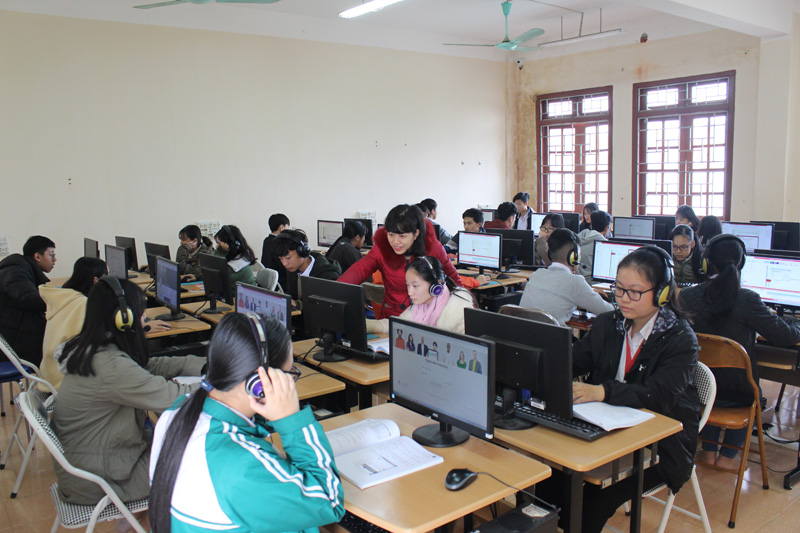
(HBO) – Improving the quality of foreign language teaching and learning is of utmost importance for the education and training sector, especially when the country is in the process of wider and deeper integration into the global economy, and moving along the trend of the fourth industrial revolution.
Photo:
Hoang Van Thu high school for gifted students equips four rooms with
internet-connected computers for the online teaching and learning of English
using the English Discoveries programme.
As a leading
high school in Hoa Binh, Hoang Van Thu is the first and only school in the
province to engage in international cooperation and teaching English using the
English Discoveries programme. Attractive lessons and abundant materials help
local students improve their four skills of listening, speaking, reading and
writing.
From the success of Hoang Van Thu High School, the provincial Department of
Education and Training directed all schools to diversify curricula and teaching
methods to meet education targets and demand for foreign language learning of
local students.
The department has put in place training course on English teaching methods for
primary teachers. Meanwhile, those who achieved B2 level are arranged to give
four lectures per week.
With the emphasis on improving local students’ listening and speaking ability,
the department has invited native English-speaking teachers and volunteers to
teach at schools and organising English speaking contests and talent
competitions for English teachers and students.
The local education sector aims to have some 15 percent of kindergartens in the
province promote IT application and access English teaching by 2020, and at
least 30 percent of kindergartens access English teaching by 2025. In the
system of general schools, the sector is striving to have some 73 percent of
primary schools, 50 percent of junior high schools, and 61 percent of senior high
schools engage in the 10-year English education programme by 2020; and 100
percent of students grading 3-6 join in the 10-year English education programme
by 2025./.
More than just an information technology teacher, Bui Van Nien is an inspiring figure who has nurtured the scientific curiosity and creative spirit of students in Vietnam’s ethnic minority communities.
Da Bac is the most disadvantaged mountainous district in Hoa Binh province, with ethnic minorities accounting for about 90% of its population. Over the past years, the district has mobilised resources to implement ethnic policies to improve the quality of life of local people.
In recent years, Hoa Binh province has consistently prioritised the protection, care, and education of children, particularly those from ethnic minorities and disadvantaged backgrounds, by creating a safe, healthy, and nurturing environment for their all-round development.
The Steering Committee for Tobacco Harm Prevention and Control of Hoa Binh province, in coordination with the Tobacco Harm Prevention and Control Fund, held a ceremony on May 28 in response to the World No Tobacco Day (May 31) and the National No Tobacco Week (from May 25 to 31). The event was chaired by Nguyen Van Toan, Standing Vice Chairman of the provincial People’s Committee and head of the Steering Committee.
Since 2021, the Center for Industrial Promotion and Industrial Development Consulting (CIIDC) under the Department of Industry and Trade has been implementing a school lighting model as part of the plan for using energy efficiently and economically in Hoa Binh Province in the pẻiod of 2021 - 2025. This model not only aims to improve the learning conditions and enhance the education quality, but it also promotes the message of energy saving, energy security, environmental protection and contributes to the goals of socio-economic development.
In the 2024 - 2025 school year, the entire Hoa Binh provincial education sector includes 520 educational institutions and schools. Among them are 13 ethnic boarding schools with 153 classes and 4,487 students. Four of these schools have met national standards, reaching 30.7 percent.



